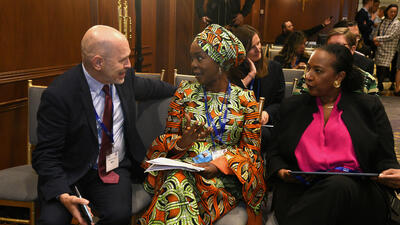Opening Remarks at the T4SD Forum High Level Session (en)
"Sustainable Trade in The Connected Future"
ITC’s 5th Trade for Sustainable Development Forum
Geneva - Switzerland
First, let me add my welcome to the distinguished panellists with me here today. I am pleased to hold this high-level panel – part of ITC’s 5th Trade for Sustainable Development Forum – and in conjunction with the WTO Public Forum.
This year’s T4SD Forum, held yesterday and Monday at ITC, focused on SDG 12: Responsible Consumption and Production.
SDG 12 aims at “doing more and better with less”, by promoting a more resource efficient economy and encouraging industries, companies and consumers to move towards more sustainable patterns of consumption.
I was very impressed by the enthusiasm of the Forum participants- who I rightly called ‘Ambassadors for SDG 12’. The discussions left me a little more optimistic about the prospects of multilateralism, and “good” – trade; despite the challenges we face these days.
One of our speakers highlighted how technology and social media had become powerful platforms for citizens to engage in global dialogues. This has not always been a force for good but, as regards sustainability issues, it can be a force for change increasing transparency on how clean value chains are and giving more information on how our clothes are made, our food grown and our smartphones assembled. This places the consumer at the centre of the debate and gives many of us a power we have not had before: the power to influence patterns of production and consumption.
At our T4SD Forum I heard many ideas on how to do this. Scrutinizing labour and environmental conditions in value chains, changing the inherent business habits towards more ethical and responsible sourcing strategies, but also making the consumer aware about how their purchasing decisions influence how production and trade will look like, and how it will affect the micro, small and medium sized businesses in developing countries. All of that matters for good trade, in line with SDG12.
I want to leave you with three key takeaways.
First, sustainability is not easy. There is no silver bullet. From the perspective of ITC’s work, producers and farmers in the global South usually bear the burden of cost. They are affected when global prices crash, but they are also often the ones that bear much of the cost associated with sustainability-related certification. We heard from a Sri Lankan manufacturer on how such a distant-sounding issue of multiple audits takes away the energy that factory owners would otherwise invest in improving the production processes. In the textile sector, a divide between global and local ‘audience’ exists: companies producing for local markets are not necessarily held accountable for basic labour rights in the same way as they would be for external markets. Thus, sustainable production is usually the reserve of the exporter or buyer, presumably based in the ‘North’, equipped with a set of de facto enforceable rules - not the local supplier.
There, the business case for sustainability, or a rules-based system, is often lacking. As such we need to create the context for sustainability regardless of the product destination. We need convergence in the market requirements and what “good” looks like for Northern and Southern producers and consumers alike, to make SDG 12 a reality.
The second takeaway from the T4SD Forum is what I already alluded to. The potential impact of voluntary measures as opposed to formal, encompassing rules. From our discussions, it was evident that our efforts to achieve the SDGs requires we take a holistic value chain approach with enforceable rules, and through engaging local stakeholders.
With big data, digital transformation and cheaper and constantly evolving technology, the full traceability of value chain should be possible.
But voluntary requirements, self- assessments, and audits were viewed as not enough to make systemic and impacting change, if taken alone. We need smart regulation, and we need smart partnerships. Individual initiatives for more sustainable production are praiseworthy, but we need to achieve scale.
The third message relates to us – the consumers. SDG12 is targeted on two sides of the same coin – sustainable production can be nudged by sustainable consumption, a significant shift in consumer behaviour and the purchasing power behind. As was pointed out yesterday, however, more sustainable consumption does not necessarily relate only to buying sustainable products; sustainability is a lifestyle.
This is the interesting piece of the puzzle in my view. There is a consensus that we need to incentivize consumers to do their part. And yet, the economic reality often runs counter to this conscious consumer narrative. An important element of the economic growth equation is increased consumption. To grow, we need to consume more and more. On a mission to become a more conscientious consumer, you are challenged by an incredibly complex sustainability messaging, an overwhelming number of labels and claims.
Let us look at our own culture – promoting and consuming fast fashion –, which drives more production, more consumption, more audits and more waste. Taking the SCP (Sustainable consumption and production) perspective, we can go as far as the circular economy concept: According to the Ellen MacArthur Foundation, adding one use cycle to products such as smart phones or washing machines could lead to annual net material cost savings opportunity of USD 380 billion in EU manufacturing sectors.
Lifestyle matters. In some societies, there is a notion that we have reached “peak consumption” or “peak stuff” and that these societies are migrating to a sharing economy – a culture of having less stuff and experiencing more. As such, we were reminded that middle-class lifestyles do not have to come with a middle class footprint.
But the question remains: is this applicable across many different markets? Look at the consumer culture in many growing middle income countries? Can we also leapfrog consumption patterns and consumer changes by asking people to move straight from having limited access to goods and services to go straight to sustainable consumption, to a conscious consumer?
This is indeed a challenge: changing the disposable mindset for a reusable one. We concluded the T4SD Forum with a personal call for us to do our own “personal” audits, to take stock, and make impacting changes that can affect our communities.
These are the themes we see influencing the sustainability debate and ways that we can positively move the needle on SDG 12.
With this in mind, I am looking forward to hearing and learning from the panellists, to see what solutions we can bring forward.
A final pitch is for you all to download the recently launched publication: ‘State of Sustainable Markets’ report which is your ‘bible’ for data and analytics in this area.
Thank you.






